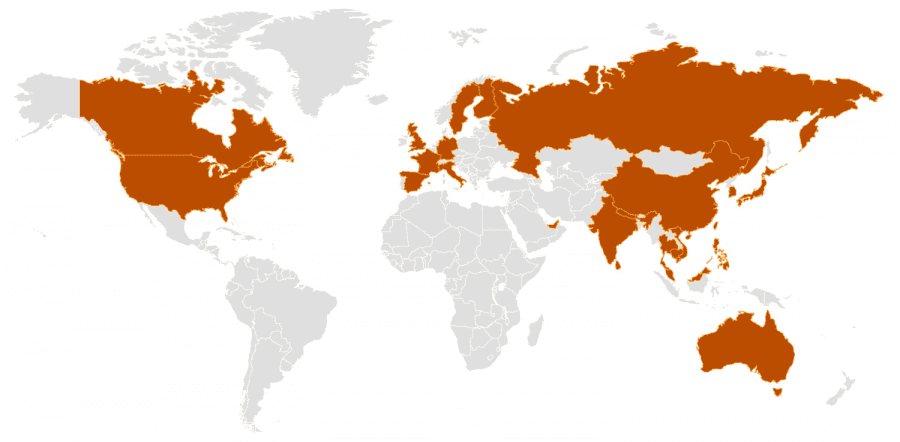Chinese students discuss coronavirus’ impact
More than 14,000 cases of the coronavirus have been reported, with only about 150 occurring outside of China. Photo courtesy of the CDC
February 3, 2020
Jiaxuan Zhang, a junior majoring in creative media and communication studies, is an international student from China. He hails from Yan’an, a city in the province of Shaanxi with a population of about 2 million.
Before the outbreak, Zhang had plans of returning to China in July of this year.
“I think [the outbreak] will last for a few months,” Zhang said. “By the next time I plan to go back home in the summer, July, I believe this situation will be done. I hope.”
The virus was first reported in Wuhan, China, on Dec. 31, 2019. According to an updated report from The New York Times, more than 2,000 new cases were recorded in the past 24 hours, adding to a total of 14,557. The report said that only 150 of those cases have been confirmed outside of China.
“At that time, it was very close to the Spring Festival in China,” Zhang said. “The winter holidays started, and people started to go back home from their school, from their work.”
Chinese New Year is a special time of year where many city dwellers go back home to their families in the countryside of China. In 2020 the Chinese national holiday started on Jan. 24 and was supposed to end on Jan. 30. With the emergence of the coronavirus, it has now been extended by three days to Feb. 2, as authorities in China seek to contain the outbreak.
“Some people went back unknowingly affected by the virus, and at that time they showed no symptoms,” Zhang said. “That’s a problem. The symptoms did not show up for like two weeks.”
The problem with this, Zhang said, is that it allowed the virus to spread from not just Wuhan, but everywhere in China as people returned home.
UA News issued an email to all students on Jan. 29, stating that there were no cases on campus.
“The risk for Alabamians remains low at this time, and we – along with the Centers for Disease Control and Prevention and the Alabama Department of Public Health – are closely monitoring the ongoing situation,” the email stated. “This coronavirus can cause mild illness that can be overcome, but more severe cases can be life-threatening. More information about the 2019 novel coronavirus is available on the CDC website.
“Symptoms of coronavirus include, but are not limited to, fever, running nose, headache, cough and the general feeling of being unwell; these are also symptoms of the common flu virus. If you have these symptoms, it is likely the common cold or a common strain of the flu. It is unlikely that anyone will be diagnosed with coronavirus at this time unless they have traveled to affected countries or had contact with someone who has. If you have concerning symptoms, please call the employee or student health clinic prior to visiting.
“The UA System has extensive expertise and systems in place to monitor and address possible infectious diseases. However, you should take general precautions like frequent hand washing to prevent the spread of any virus, including seasonal flu, which is still active across Alabama and the U.S. If you have not received a flu shot, it is not too late. For additional advice on flu facts and prevention, visit cdc.gov/flu.”
Morris Charter, director of International Student & Scholar Services, sent out an email at 5:14 p.m. on Feb. 1, informing international students of travel restrictions and an “expanded travel ban” following the outbreak.
Xixi Cao, a freshman majoring in elementary/preschool education, is a Chinese international student from Beijing, where she grew up near Tiananmen Square. She currently has plans to return to China in the summer, where the rest of her family lives, but her plans are on hold as the outbreak is currently not under control. Cao said that Wuhan is the only province she knows of that is currently under quarantine and that other cities are also affected, but she doesnt think they are as severe.
Cao has a friend that is currently a master’s student in California who was unable to return to the U.S. because of the travel ban after visiting for winter break. After seeing airports in San Francisco and Los Angeles cancel flights from and to China between Feb. 6 to March 28, Cao worries he won’t be able to complete his semester.
Cao was 2 years old when Severe Acute Respiratory Syndrome (SARS), a mutated common flu virus similar to the coronavirus, broke out in Beijing, making the coronavirus the second epidemic she’s lived through.
“This one is worse,” Cao said. “It’s terrible. But I think our government can handle this, since we already have the experience from the SARS one.”
Since the outbreak, Cao has FaceTimed her mom every day to make sure that she is alright and that her family is OK. She recently found out that the New Years holiday, which was originally seven days, has been extended to two weeks.
“I wanted to buy face masks here and send them back to China, but they were all sold out,” Cao said. “Even here in the U.S.”
Though the travel ban has created physical obstacles for international travelers, Cao said the ban has also had negative social effects as well.
“I understand [the travel ban],” Cao said. “I really agree with what they’re doing, but I cannot accept that people call this virus the Chinese virus.”
Cao said a friend from Boston has experienced racism from her schoolmates following the outbreak. Some people, she said, would look at her friend in the face and say things like ‘Go back to China, you’re bringing the virus to this country.’”
“I’m super mad about this,” Cao said. “She hadn’t been home since last year. They don’t even know her. They don’t even know if she’s Chinese or not. What if she’s Japanese? What if she’s Korean?”
Though Cao hasn’t encountered any comments on campus, she worries that what happened to her friend may happen to her.
“I would feel pretty hurt inside of me,” she said. “So I start to worry about myself, and what if people walking the streets start saying things like, ‘You’re bringing the virus, you’re bringing something bad into the country.’”










